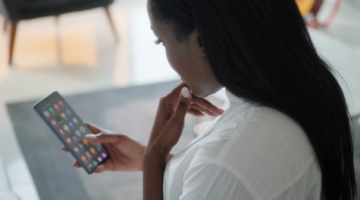The video of a woman conversing with her young son in their kitchen looks like a routine interaction from a middle class African-American home. As he sits at their kitchen counter playing a video game on a small electronic device, she asks, “Did you study?” He replies affirmatively. After making certain that he has, she asks her young teenage son to wear “that vest.” The youngster sighs uncomfortably, then asks, “Mom, are you serious.”
Her next statement captures a growing sentiment among African-American parents of young black boys across the nation:
“I need to know when I’m at work that you’re going to be safe. Do it for me.”
After he reluctantly agrees, she helps her son to don a black bulletproof vest.
The one minute and 24 second long public service announcement is the work of the Dream Defenders, a group that is being called the next generation of civil rights leaders. According to its website, the mission of the Dream Defenders is to “develop the next generation of radical leaders to realize and exercise our independent collective power; building alternative systems and organizing to disrupt the structures that oppress our communities.”
Fusing the power of technology and social media to deliver visually compelling messages, the PSA is the latest video created by, or that features, the Dream Defenders in its quest to dismantle a system that, according to the PSA, results in an African American being killed every 28 hours “by a police officer, security guard or vigilante.”
Dream Defenders first garnered national attention and the support of legendary entertainer and activist, Harry Belafonte, who joined the group during their 31-day sit-in at Governor Scott’s office in 2013. The sit-in was the organization’s response to Zimmerman’s acquittal in the shooting death of Trayvon Martin and their call for Scott to call a special session to address the state’s controversial “Stand Your Ground” law.
In a different, but also compelling video, the group’s executive director, Phillip Agnew, 29, responds to a white man’s assertions that neither he nor his relatives are responsible for what their ancestors did to black people. The exchange between Agnew and Ross Kaminsky, a white columnist for the American Spectator, was captured during a filming of a Sept. 26 PBS special, ‘America After Ferguson,’ a town hall meeting held at the University of Missouri one month after Officer Darren Wilson shot and killed unarmed teen, Michael Brown.
Kaminsky took issue with Agnew’s statement that blacks must be organized in order to deal with “a system that has, for 400 years, perfected the method of repression of people that look like me, look like us.”
PBS host, Gwen Ifill, moderated the discussion among the diverse audience of black and white, young and old that was broadcast live and is currently available for viewing on the PBS website.
“I understand the feeling of the system isn’t fair, it’s biased against us, but then when you start going to this idea 400 years of repression and ‘the system is still designed to hurt us, it’s still designed to keep us down,’ that starts feeling, to me, like racism against me just because of the color of my skin,” said Kaminsky.
When Ifill asked him if Kaminsky’s assessment of his remarks were accurate, Agnew replied, “No, absolutely not. I never mentioned black, white or people. I mentioned systems.”
Agnew surmised that based on America’s system and its history, Officer Wilson could escape an arrest and conviction for killing Brown. He reasoned that even if Wilson is arrested and convicted, “it will not alleviate the problems that are happening here and that are happening around the country,” because they are systemic.
“It’s about a system of police repression, police harassment, racial profiling. We’ve got a school to prison pipeline, we’ve got a war on drugs that’s been afflicting, dividing and killing our community since it started. We’ve got a war on the poor, [and] we’ve got a war on immigrant communities.”
Agnew said the system also overwhelmingly depicts black males as dangerous and malevolent, which greatly impacts on how some people, like George Zimmerman, perceive them.
He was to have spoken on August 28, 2013 in Washington at the event commemorating the 50th anniversary of Martin Luther King Jr.’s “I Have a Dream” speech; however, at the last minute, was told that there was no time left for him to speak.
Undaunted, he videotaped the speech and made it available on YouTube. The video, ‘Our March,’ now has over 64,000 views.
Michelle Hollinger may be contacted at michellehollinger303@gmail.com
For more information about the Dream Defenders, please visit dreamdefenders.org.













No Comment